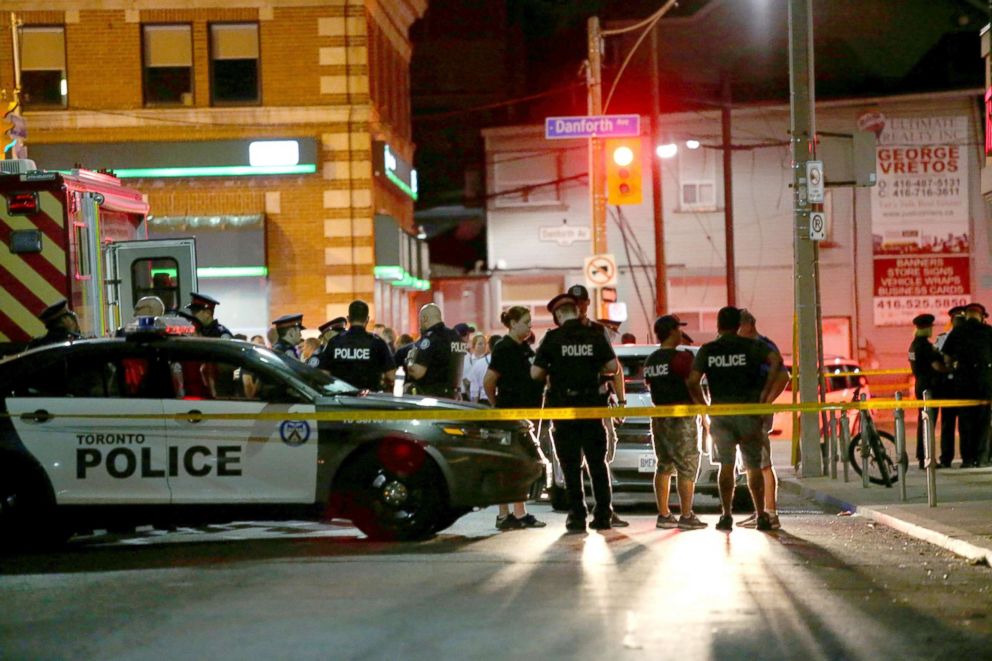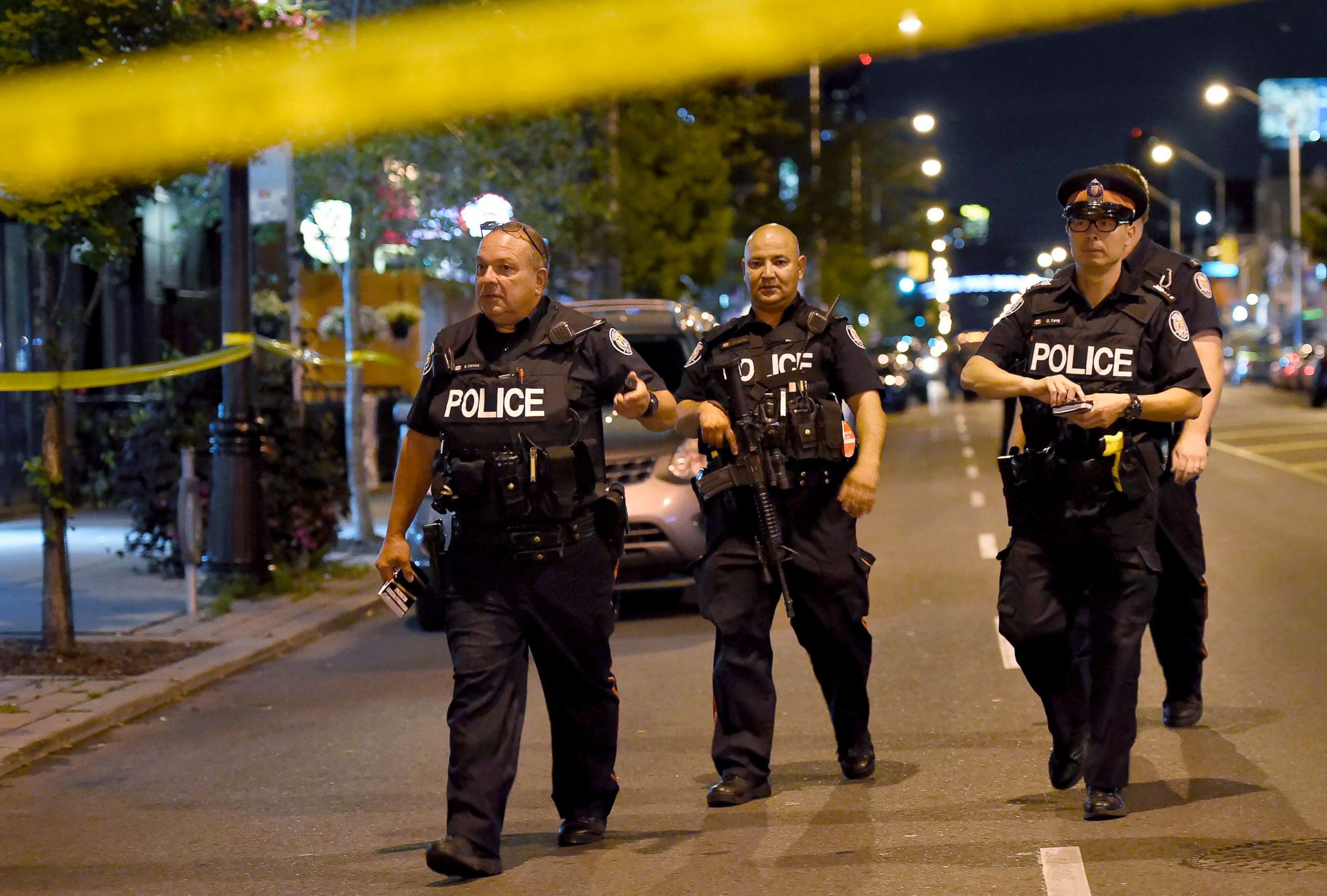'Another tragedy in our city this year': Amid Sunday night's violence, Toronto shootings on the rise
A 10-year-old and a young woman died in a Sunday night shooting in Toronto.
Gunfire rang out in the middle of a bustling Toronto neighborhood Sunday night, killing a girl and young woman who are now tied to the more than 200 shootings in the city so far this year.
It was about 10 p.m. Sunday when a gunman fired round after round as residents sat down to dinner in an area populated by bars and restaurants, police said.
The shooter killed the 10-year-old girl and the 18-year-old woman and left 13 others injured. Police killed the suspect in a gunfight, according to authorities.

Toronto Mayor John Tory Monday morning called it "a tragedy -- another tragedy in our city this year," where shootings have been on the rise for its 2.9 million residents.
Since 2014, shootings and shooting victims had more than doubled in Toronto by last year, according to the Toronto Police Service. Statistics through the first half of 2018 show similar increases.
Year to date (as of July 16)
2014: 97 shootings, 123 victims
2015: 160 shootings, 255 victims
2016: 201 shootings, 285 victims
2017: 196 shootings, 286 victims
2018: 220 shootings, 286 victims
Year end
2014: 177 shootings, 242 victims
2015: 288 shootings, 429 victims
2016: 407 shootings, 581 victims
2017: 395 shootings, 594 victims
Compared to its fellow Canadian cities, Toronto has experienced many more homicides and nondeadly shootings in the past two years, according to the Major Cities Chiefs Association, which represents police executives in the largest U.S. and Canadian cities.
Here is a sampling:
Montreal Police
2016: 23 homicides, 60 nonfatal shootings
2017: 27 homicides, 46 nonfatal shootings
Ottawa Police
2016: 25 homicides, 56 nonfatal shootings
2017: 17 homicides, 68 nonfatal shootings
Vancouver Police
2016: 12 homcidies, 23 nonfatal shootings
2017: 19 homicides, 27 nonfatal shootings
Toronto Police
2016: 74 homicides, 152 nonfatal shootings
2017: 61 homicides, 150 nonfatal shootings
In Toronto, “The vast majority of the gun play in the city can be associated somehow with a street gang,” Police Chief Mark Saunders told local media outlet CP24 earlier this month.
"This is pointed to specific people. A random person walking down the street, it is highly unlikely that they are going to be in harm’s way," he said, weeks before Sunday's shooting that took the lives of two young people.

Saunders acknowledged to CP24 that there has been an increase in shootings and homicides but told the media outlet, “When we go back to 2016, the numbers are almost on par."
Toronto Police did not immediately respond to ABC News' request for comment.
Though Toronto's shootings are on the rise, and cause for concern, they are modest by U.S. standards.
Take Chicago, which is about the size of Toronto with a population of about 2.7 million but roughly seven times more shootings last year, with 2,785, according to the Chicago Sun-Times.
Overall, Canada sees much fewer homicides than the United States, according to the Major Cities Chiefs Association.
Canada
2016: 225 homicides
2017: 217 homicides
U.S.
2016: 7,044 homicides
2017: 6,791 homicides
"The U.S. has had a higher level of violent crime and gun violence, particularly in our major urban areas," said John Cohen, an ABC News contributor and former U.S. counterterrorism coordinator for the Department of Homeland Security. "Canada has historically not experienced the same levels of violent crime that we see here in major cities in the U.S."
But despite the differences in day-to-day crime, attacks like Sunday's mass shooting are a common theme in the United States, Europe and Canada, Cohen said.
"Law enforcement in Canada, as well as law enforcement in the U.S. and Europe, are seeking to find more effective ways to counter the emergence of the threat posed by individuals who either are motivated by some ideological or nonideological cause to go out and commit mass casualty attacks," Cohen said.
As authorities investigate Sunday's shooting, Cohen said, "What law enforcement will be examining is, is this specific incident an outgrowth of a general increase in violent crime, or was this an act conducted by a disaffected individual who turned to mass violence in furtherance of some ideological cause or grievance."

In the wake of Sunday night's shooting, Tory, the Toronto mayor, told the city council Monday there must be a discussion about access to guns.
"Gun violence in any part of our city is completely horrible and unacceptable," he said. "I've said for some time that the city has a gun problem, in that guns are far too readily available to far too many people."
He added: "You've heard me ask the question of why anybody would need 10 or 20 guns, which they can lawfully do under the present laws. And that leads to another question we need to discuss: Why does anyone in this city need to have a gun at all?"
Saunders, the city police, offered to do his part.
"We do have all layers of government here to help support, to figure out what we can do to stop from a city perspective and from a national perspective, as well,” he told reporters Monday.”
I think that this is an excellent opportunity for our office to figure out what things we can do based on today’s world, today’s environment and what we need to do to move forward," Saunders said. "So I look forward to figuring out what challenges lie ahead and how we can help each other to move forward.”
ABC News' Felisa Fine contributed to this report.




